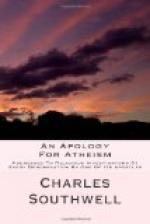’For an imagination to exist there must be two properties or qualities coming in contact with each other to produce that imagination. For these two properties or qualities to exist there must be matter for them to exist in; and for matter to exist there must be space for it to exist in, and so on. Matter might exist without two different properties to produce an imagination; but neither two properties nor one property can exist without matter for it to exist in. Man may exist for a time as he does when he is dead without an imagination; but the imagination cannot exist without the material man. Matter cannot become non-existent, but the imagination can and does become so. Matter therefore is the reality and the imagination a nonentity, an unsubstantial idea; or an imagination only.’ [52:1]
The anonymous writer of the passages here given within inverted commas clearly draws the line of demarcation between the real and the unreal. His remarks on imagination are specially important. Theologians do not seem to be aware that imagination is a modification of mind, and mind itself a modification of sensibility—no sensations—no thought—no life. Though awkwardly expressed, there is truth in the dogma of Gassendi—ideas are only transformed sensations. All attempts to conceive sensibility without organs of sense are vain. As profitably might we labour to think of motion where nothing exists to be moved, as sensibility where there is no organ of sense. We often see organs void of sensibility, but who ever saw, or who can imagine sensibility independent of organs? Pantheists and other Divinitarians write about mind as if it were an existence; nay, they claim, for it the first place among existences, according to ‘mere matter’ the second. The ‘Shepherd’ plainly tells us mind is a primary and matter a secondary existence. Having conjured up an Universal Mind God, it was natural he should try to establish the supremacy of mind—but though a skilful logician he will be unable to do so. Experience is against him. On experience of natural operations Materialists base their conclusion that matter without mind is possible, and mind without matter is impossible. It has been proved that even the modification of mind called imagination is indebted for all its images, yea, for its very existence as imagination, to the material world.
D’Alembert states in the Discourse prefixed to the French Encyclopaedia that ’the objects about which our minds are occupied are either spiritual or material, and the media employed for this purpose are our ideas either directly received or derived from reflection’—which reflection he tells us ’is of two kinds, according as it is employed in reasoning on the objects of our direct ideas, or in studying them as models for imitation.’ And then he tells us ’the imagination is a creative faculty, and the mind, before it attempts to create, begins by reasoning upon what it sees and knows.’ He lauds the metaphysical division of things into Material and Spiritual, appending however to such laudation these remarkable words—’With the Material and Spiritual classes of existence, philosophy is equally conversant; but as for imagination, her imitations are imitations entirely confined to the material world.’




